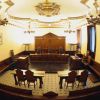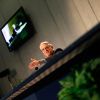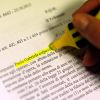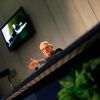Judges in 'VatiLeaks' case say computer tech was hard to believe
VATICAN CITY - Explaining why they found a Vatican computer technician guilty of aiding and abetting the papal butler who stole private papal correspondence, Vatican judges said they found much of his testimony hard to believe.
Vatican court finds computer tech guilty of aiding, abetting butler
VATICAN CITY (CNS) -- A Vatican court found Claudio Sciarpelletti, a computer expert in the Secretariat of State, guilty of aiding and abetting the papal butler, who was convicted of stealing sensitive Vatican correspondence.
The three-judge panel hearing the case Nov. 10 initially sentenced Sciarpelletti to four months in jail but reduced the sentence to two months, saying Sciarpelletti had never been in trouble with the law and previously had served the Vatican well.
The judges suspended even the two-month sentence and said that if, over the next five years he commits no other crimes, the penalty would be lifted.
The Vatican court indicted Sciarpelletti in August, accusing him of helping Paolo Gabriele, the papal butler, by obstructing the Vatican investigation of the butler's role in stealing, photocopying and leaking private Vatican correspondence to an Italian journalist. The butler is serving an 18-month sentence in a cell in the Vatican police barracks.
After an unnamed source told Vatican investigators in late May that Sciarpelletti and Gabriele were in frequent contact, Vatican police searched Sciarpelletti's office in the Secretariat of State. The police said they found an envelope marked "Personal: P. Gabriele."
The court did not reveal details about the envelope's contents other than mentioning assorted emails signed "Nuvola" (cloud in Italian), a small section of a book written by the Italian journalist who received leaked documents from Gabriele and pages of articles downloaded from the Internet.
Sciarpelletti was arrested in late May and held in a Vatican cell for one night, after which he was released on a bail of 1,000 euros (about $1,270). In its sentence Nov. 10, the court said it would return the bail to Sciarpelletti, but it also ordered him to pay the court costs, which are about the same amount, said Jesuit Father Federico Lombardi, Vatican spokesman.
The Vatican prosecutor accused Sciarpelletti of obstructing the Gabriele investigation by giving different versions of how he obtained the envelope and by changing his descriptions of his relationship with Gabriele.
The court session Nov. 10 began with the testimony of Sciarpelletti. Giuseppe Dalla Torre, president of the three-judge panel, asked the defendant why he changed his story in the month after his arrest.
Sciarpelletti said his arrest was "traumatic," which, combined with the fact that he received the envelope years ago, made it difficult to remember exactly how he came to have it in his desk. He said he did not know what was in the envelope since he never opened it because it was marked "personal."
The computer tech first told investigators that he received the envelope from Gabriele; then he said he received it from his superior, Msgr. Carlo Maria Polvani, head of the Vatican Secretariat of State's office for information and documentation.
Saying, "I swear on my baptism and my priesthood," Msgr. Polvani told the court Nov. 10 that he had never violated the secret of his office and had never improperly removed, copied or shared any confidential Vatican documents. He denied giving Sciarpelletti the envelope.
Msgr. Polvani, the 47-year-old nephew of Archbishop Carlo Maria Vigano, the nuncio to the United States, said he only met Gabriele when the butler came to visit Sciarpelletti in their office, something Msgr. Polvani said he thought happened often. "I think they were good friends," he said.
Gabriele, who also testified Nov. 10, told the court that Sciarpelletti "was a friend and I confided in him," including about "worrying things that were happening in the Vatican." The butler said he gave Sciarpelletti the papers, seeking his opinion about them. But Gabriele said, as far as he remembers, he gave Sciarpelletti the papers on various occasions, so Sciarpelletti must have put the papers in the envelope himself.
Father Lombardi told reporters that Vatican investigators had not closed their files on the "VatiLeaks" scandal; further investigations and even indictments are possible, he said.
The court session Nov. 10 was not without its lighter moments: the court reporter's computer stopped working at a certain point. Sciarpelletti asked, "Do you need a technician?" and everyone in the courtroom burst out laughing. Gianluca Gauzzi Broccoletti, the Vatican police officer who was testifying, got up and discovered that the electrical outlet being used was no longer working. An extension cord was plugged into a different outlet and the testimony resumed.
'VatiLeaks' trial of Vatican computer tech begins
VATICAN CITY - A Vatican computer technician charged with aiding and abetting the papal butler in stealing confidential documents went on trial amid legal arguments over the definition of the charge and questions about the "anonymous source" who reported him to officials.
VATICAN CITY (CNS) -- A second criminal trial opens Nov. 5 in the little courtroom on the ground floor of the Vatican's tribunal building, located just behind the apse of St. Peter's Basilica.
Claudio Sciarpelletti, a computer technician in the Vatican Secretariat of State, is to be tried on charges of aiding and abetting Paolo Gabriele, the papal butler, who was convicted of aggravated theft for stealing or photocopying private Vatican correspondence -- including letters to and from the pope.
The Vatican court's indictment of Sciarpelletti was released Aug. 13 along with the indictment of Gabriele.
The papal butler was arrested May 23 after a police search of his Vatican apartment turned up hundreds of sensitive documents, including many that had been leaked to an Italian journalist. Informed of "continual contacts" between Gabriele and Sciarpelletti, the Vatican court authorized a search May 25 of Sciarpelletti's office in the Secretariat of State, the indictment said.
Sciarpelletti himself led police to their key piece of evidence against him: an envelope in his desk. On the outside of the envelope was written: "Personal: P. Gabriele," the court said. The back of the envelope was marked with the secretariat's seal.
The computer tech was arrested May 25 and held by Vatican security overnight. According to the court documents, his descriptions of his relationship with Gabriele and of the origin and destination of the envelope changed several times over the course of the investigation.
Originally, Sciarpelletti was accused of giving false testimony, conspiracy to commit aggravated theft, aiding and abetting a thief and violating the secrets of his office.
The Vatican court said Sciarpelletti first claimed he knew Gabriele only in passing, but it turned out the two communicated frequently and saw each other -- with their wives and children -- socially as well as at work. He initially said Gabriele gave him the envelope "a couple years ago," asking him to read it and let him know what he thought. The next day, he said that the envelope was given to him by someone identified in the indictment only as "W," and that he was supposed to pass it on to Gabriele.
"The contrasting version of facts furnished by the accused Claudio Sciarpelletti may have hindered the investigation," the indictment said. However, the charges were reduced to "aiding and abetting," which is the closest crime the Vatican has to an accusation of being an accessory after the fact.
The arrest and trial of Gabriele made headlines around the world, and newspapers carried photographs of him on duty before his arrest riding in the front of the popemobile and assisting the pope with his coat. But Sciarpelletti is not known publicly, and Jesuit Father Federico Lombardi, Vatican spokesman, said the Vatican court already has accepted a request from the defense that there be no television cameras or photographers -- not even the Vatican's own -- in the courtroom.
During the Gabriele trial, the three-judge panel hearing the case severely limited any testimony about the contents of the documents Gabriele was accused of stealing and leaking to an Italian journalist. Many of documents that were published concern financial mismanagement, corruption and careerism in the Vatican.
In the indictment, the Vatican court said that among the papers in the envelope Sciarpelletti had was an account titled "Napoleon in the Vatican," which appears in the book published by Gianluigi Nuzzi, the journalist who received documents from Gabriele.
The account focuses on how Domenico Giani, the head of Vatican security, quickly and quietly dealt with an incident in which a vehicle with Vatican license plates was hit by four .22-caliber bullets while parked at a Rome restaurant where Vatican police were eating with colleagues from Interpol. In the end, the incident was attributed to an unknown person with emotional problems who saw the Vatican license plates and started shooting. A restaurant employee who heard the shots reportedly told police he thought they were fireworks.
"Napoleon in the Vatican" also talks about two Vatican police officers and a staff member who reportedly own shares in Italian security firms. Nuzzi says "conflicts of interest" could arise in the future if the Vatican were to ever enter into business with the firms.
Sciarpelletti's attorney already has called Giani and Gianluca Gauzzi Broccoletti, one of the police officers, as witnesses in the trial.
Other witness include: Gabriele himself; Msgr. Carlo Maria Polvani, Sciarpelletti's superior in the Secretariat of State; and Maj. William Kloter, vice commander of the Swiss Guard.
Sciarpelletti spent one night in a Vatican jail cell and then was released on his own recognizance. If found guilty, he is not expected to be sentenced to jail time, although the charge could carry a penalty of up to one year in prison.
VATICAN CITY (CNS) -- Claudio Sciarpelletti, the Vatican Secretariat of State computer technician accused of aiding and abetting the pope's butler in stealing confidential Vatican correspondence, will go on trial at the Vatican Nov. 5.
The Vatican announced the trial date Oct. 23. Jesuit Father Federico Lombardi, Vatican spokesman, told reporters that Sciarpelletti's trial on the "minor charges" of aiding and abetting was expected to be brief.
Also Oct. 23, the Vatican released a 15-page document from the three-judge panel that found the butler, Paolo Gabriele, guilty Oct. 6 and sentenced him to 18 months in jail.
After criminal trials in Italy and at the Vatican, the judges publish a detailed explanation of how they arrived at their verdict and how they determined the sentence. Father Lombardi said a Vatican prosecutor will study the document and has 40 days to decide whether he will file an appeal, something usually done to request a harsher sentence.
Gabriele, who also had a chance to appeal his conviction, declined to do so; he remains under house arrest until the prosecution decides about its appeal, Father Lombardi said. Pope Benedict XVI also could pardon his former butler.
Father Lombardi said that if the pope does not pardon the 46-year-old Gabriele, Vatican judicial officials plan to have him serve his sentence in a 12-foot-by-12-foot cell in the Vatican police barracks and not in an Italian prison.
The report included the fact that the judges denied a request by Gabriele's lawyer to have retired Cardinals Ivan Dias, former prefect of the Congregation for the Evangelization of Peoples, and Georges Cottier, former theologian of the papal household, testify before a papally appointed commission of cardinals conducting a separate investigation of the leaking of Vatican documents.
The judges said it was beyond their powers to do so; there was no explanation of what kind of information the defense thought the two cardinals could provide.
In the judges' report, they said that while Gabriele consistently maintained he acted out of love for the pope and the church, the judges felt an obligation "to observe how the action undertaken by Gabriele in reality was harmful" to "the pontiff, the laws of the Holy See, the whole Catholic Church and Vatican City State."
Much of the material simply summarized information collected during the initial investigation of Gabriele and the testimony given during his trial Sept. 29-Oct. 6.
But the judges' reactions to several points raised by Cristiana Arru, Gabriele's lawyer, were explained in detail, particularly regarding Arru's contention that since the material found in Gabriele's apartment consisted of photocopies, not originals, the former butler didn't actually steal anything.
First, the judges said testimony from Msgr. Georg Ganswein, the pope's personal secretary, and from Vatican police officers who searched Gabriele's Vatican apartment proved to them that a few originals were among the photocopies.
Second, they said, Gabriele removed the originals without permission in order to photocopy them, but even more, they said, while he might not have stolen many original documents, by photocopying them he took the information written on them without consent.
"The paper document is nothing other than the support material for an immaterial content," the judges said.
During the trial, Arru repeatedly raised questions about the Vatican prosecutor's assertion that police found in Gabriele's Vatican apartment three items given to Pope Benedict as gifts: a check for 100,000 euros ($123,000); a gold nugget from the director of a mining company in Peru; and a 16th-century edition of a translation of the "Aeneid."
The judges' explanation of their verdict basically said they made their judgment based on the theft of confidential papal and Vatican documents, not on the three gifts.
A separate area of the report concerned whether or not Gabriele was capable of understanding his actions, which the judges answered affirmatively.
The judges cited several statements made by Gabriele, both during the investigation and at the trial, to the effect that he knew what he was doing was wrong, he took extra precautions to avoid being caught and he went to confession when it became clear he was about to be arrested.
The judges also discussed the points that, in their view, made Gabriele's actions a case of "aggravated theft" and not simple theft.
The main aggravating factor, they said, was the fact that Gabriele abused his position of trust: "In effect, Gabriele was able to commit the crime he's accused of because of his work relationship with the Holy Father, which necessarily was based on a bond of trust."
Gabriele's job brought him into the very private life of Pope Benedict, and the butler violated the "absolute reserve" such a position required, the judges said.
"He used this unique position to perpetrate his criminal actions," they said.
While recognizing that Gabriele was not paid for leaking the documents to an Italian journalist (who, in turn, published them in an instantly best-selling book), the judges said he still committed the crime with the intent to profit from it "intellectually and morally."
The judges quoted him as telling investigators, "Even if the possession of those documents was illicit, I felt I had to do it for various reasons, including my own personal interests." Gabriele, they said, felt that having the documents would help him better understand the inner workings of the Vatican, and leaking them to a journalist would help him provide the "shock" that could lead to change in the Vatican, which he felt was becoming filled with corruption and careerism.
In the verdict, the judges ordered Gabriele to pay the Vatican's court costs, which Father Lombardi said amounted to the equivalent of about $1,300.
'VatiLeaks' trial will be landmark event for Vatican tribunal
VATICAN CITY - For the Vatican's criminal court, the trial of Paolo Gabriele and Claudio Sciarpelletti for their alleged part in leaking papal correspondence will be unusual and may lead the Vatican to invoke a never-used co-operation agreement with Italy.
Vatican trial date set for two men indicted in VatiLeaks scandal
VATICAN CITY - A Vatican magistrate has set a trial date for two men formally indicted in connection with the so-called "VatiLeaks" scandal.
The first day of the public trial, which will be held in a Vatican courtroom, is set for Sept. 29, the Vatican announced Sept. 17.
Paolo Gabriele, Pope Benedict XVI's former personal assistant, was indicted in mid-August on charges of aggravated theft; Claudio Sciarpelletti, a computer technician from the Vatican Secretariat of State, was indicted on minor charges of aiding Gabriele after he stole Vatican correspondence.
Jesuit Father Federico Lombardi, the Vatican spokesman, said a small pool of print reporters will be permitted to attend the proceedings, but still and television cameras will not be allowed access.
Gabriele and Sciarpelleti will face a panel of three Vatican judges, all of whom are laymen and professors at Italian universities. Vatican law, like Italian law, does not foresee the use of juries in criminal trials.
Gabriele, 46, faces a sentence of one to six years in prison. Under the terms of the Vatican's 1929 treaty with Italy, a person found guilty and sentenced to jail time by a Vatican court would serve his term in an Italian prison.
Lombardi had said in August that the charge against Sciarpelletti carried a "very light" sentence, which is unlikely to include jail time.
Gabriele was arrested May 23 after confidential letters and documents addressed to the Pope and other Vatican officials were found in his Vatican apartment. Many of the documents were the same as those featured in a January television program by Italian journalist Gianluigi Nuzzi and later published in a book by him. Most of the documents dealt with allegations of corruption, abuse of power and a lack of financial transparency at the Vatican.
A report released after a Vatican-led investigation of the affair said Gabriele told Vatican investigators he acted after seeing "evil and corruption everywhere in the Church." He said he had discussed with a spiritual advisor his concerns about the Church and what he was thinking when he took the documents.
Gabriele was questioned repeatedly over the two-month period he spent detained in a room in the Vatican police barracks. He was allowed to return, under house arrest, to his Vatican apartment with his wife and family July 21 and was to remain under house arrest until his trial ends.








